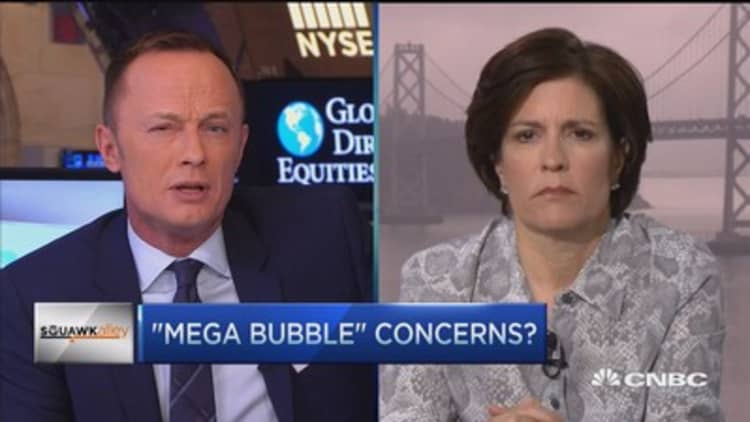
For a change, Apple is playing catch-up in a technology market.
Last year revenue for Ascap—the American Society of Composers, Authors and Publishers—surpassed $1 billion for the first time. Ascap also tracked 500 billion performances of songs last year. A big part of the success: streaming music. The actual streaming of tracks surged 54 percent from a 106 billion songs in 2013 to 164 billion in 2014.
If Apple's download-based iTunes empire isn't finished yet, it's certainly threatened. Consumers are showing a willingness to make the switch—and psychological shift—from actual ownership of music to subscription-based streaming. And Apple knows it.
When Apple paid $3 billion last year for Beats Music, it wasn't just for the premium headphones market that Beats dominates. Next week Apple is expected to unveil its new version of Beats' streaming music service at its Worldwide Developers Conference.
Recent reports indicated that Apple had failed to convince record companies to allow it to offer a streaming service at a better price point than the existing players, a sign that with the rise of streaming it was harder for Apple to command the respect—even deference—it has come to expect.
Read MoreApple CEO lashes out at Google, Facebook apps
Apple may offer a free trial period to hook users, and with 800 million people with iTunes accounts, converting just a small percentage could be a windfall, quickly making Apple the leader in streaming music. But the company has its work cut out for it. While Apple hasn't always been first—it's just usually been regarded as best—in launching new products, the streaming music space already has a significant number of successful options.
Here are the main competitors in the streaming-music market with a head start on Apple.
Spotify
Streaming-music service Spotify, which came to life in Sweden as a response to music piracy, has arguably had one of the biggest disruptive influences on the music business in the industry's history. Even the idea of a musical genre is being upended by streaming, according to a recent New York Times report. It's no surprise that Apple is expected to launch celebrity playlists with its streaming-music service.
The service has upended the radio industry and music publishing alike and generated a lot of money in the process, with estimated 2014 revenues of $1.3 billion—though profits remain elusive. It has made the CNBC Disruptor 50 list for three years in a row.
That sort of success spurs competitors to try harder and lures new ones to the field. Spotify is trying to stay one step ahead of Apple and everyone else in streaming, and to steal a little of Apple's thunder, it recently announced that it will add video streaming. (You can argue that's as much about fending off Google's YouTube as competing with Apple. YouTube is planning to launch its own music service, called Music Key, though it remains invite-only right now.)
Either way, the competition has never been more fierce for Spotify, particularly from the following streaming-only companies.
iHeartRadio
It may not get as much press as Spotify, but iHeartMedia's free streaming service is running a competitive race against Spotify when it comes to registered users. iHeartRadio now has 70 million users—and claims to be the fastest among streaming services to reach that milestone.
The ad-supported service offers live and custom stations, rather than playlists. One difference between its model and others in streaming comes by leveraging its history—it used to be Clear Channel Communications before rebranding to iHeartMedia last year.
Read More
It gives users access to more than 2,000 terrestrial radio stations, so listeners in remote areas have access to some of the country's top-rated morning and afternoon drive-time programs.The company is making a concerted effort to transfer its dominance in over-the-air broadcasting to a digital base.
Pandora
The oldest of the music-streaming services, Pandora takes a different track than Spotify, focusing only on its online radio service rather than music on demand. But it still boasts an incredibly large audience of 79.2 million active listeners as of late April, a number that's notably higher than Spotify (and they listen for more than 22 hours per week).
The company is embroiled in a battle with record companies, though, over royalty rates and is having mixed luck. This month a federal appeals court agreed with a lower court ruling keeping Pandora's rate for Ascap steady, but licensing agency BMI (Broadcast Music) won its battle to raise its rates.
Its stock price has fallen 26 percent in the past year and, since a March 2014 all-time high, has been cut in half.
Rdio
Spotify's Achilles heel might be the price of its paid premium service—Apple seemed to think so if reports are accurate that it wanted record companies to allow it to offer Beats Music at a lower price point.
Rdio's basic service is set at the same $9.99 monthly fee for ad-free listening as Spotify, but Rdio has drastically undercut that with Rdio Select—and it hopes that might be a differentiated selling point. The cheaper service only allows up to 25 downloaded tracks at one time—Spotify's $9.99 service, in comparison, offers the ability to download up to 3,300 tracks, while the main Rdio service has unlimited on-demand track capabilities.
The smaller competitor unveiled the $3.99 per month premium service in May. It offers ad-free streaming, unlimited song skipping and lets users select up to 25 songs per day from Rdio's library for on-demand listening.
Tidal
The streaming service from Jay Z and other major artists launched to a wave of criticism for, among other things, a monthly subscription fee of $20. But it's a little too early to completely rule it out as a threat. Because it claims to be more artist friendly, Tidal is able to offer perks to listeners, such as the chance to meet stars, and rumors of a joint Beyoncé/Jay Z album that will be streamed only on Tidal.
The company is in image-repair mode now, but if it locks down enough exclusives, it could still become a force in the market. And even if Jay Z and Beyoncé don't launch the Tidal-only album, the service does have Jay Z at its disposal. That leads to opportunities like his recent rap attack on Apple, Google and Spotify, among others, which included this lyric:
"You bought nine iPhones and Steve Jobs is rich, Phil Knight is worth millions, you still bought them kicks, Spotify is nine million, they ain't say s**t."
One can expect that Apple's attempt next week to win the hearts and minds (and ears) of the growing consumer streaming-music market will be made in slightly different terms of showmanship.
—By Chris Morris, special to CNBC.com





